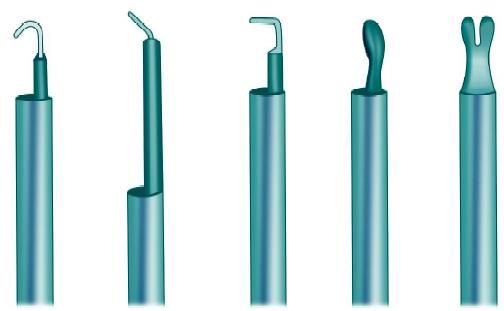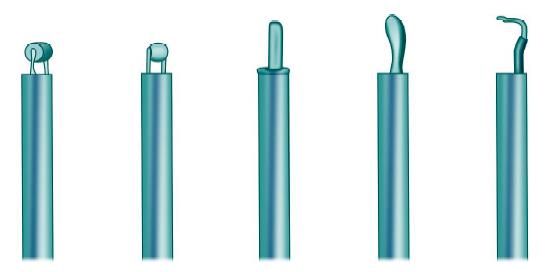Laparoscopic Hook and Spatula
Electrosurgery is the use of radiofrequency alternating current to cut and coagulate tissues. It has proven a major advance in surgery by minimizing blood loss, reducing operative time, and providing a clear and clean surgical field without the need to tie off all blood vessels. In laparoscopy cutting and the establishment of hemostasis forms the core of laparoscopic surgery. For a laparoscopic hernia repair, both monopolar and bipolar modes are required.
.jpg)
Laparoscopic Electrosurgical Hook
Coagulating and Dissecting Electrodes
Spatula and hook is the main electrode used for monopolar cutting and coagulation.
The spatula is either “W” shaped or blunt. Hooks are also of various shapes, e.g. “L” shaped, “J” shaped or “U” shaped.
Hooks are a simple instrument whose distal tip can vary slightly. They must be insulated along the entire length because they are used with the monopolar current. The hook with ceramic cone protecting the distal end is available which protects efficiently against current diffusion.
Some ball-shaped, Barrel shaped or straight coagulation electrodes are also available to achieve proper hemostasis. These blunt electrodes are particularly useful when there is generalized oozing of blood and the surgeon cannot see specific bleeder points, e.g. bleeding from the gallbladder bed at the time of laparoscopic cholecystectomy. These blunt electrosurgical instruments are also used for fulguration at the time of the ablation of endometriosis.

Various Types of Hooks and Spatula

Various Types of Hooks and Spatula
It is safer than monopolar instruments because electron travels only through the tissue held between the jaw and the patient's body is not a part of the circuit. Both the jaw of bipolar is insulated and the patient's return plate is not necessary to be attached. The detailed principle of electrosurgery is discussed later in laparoscopic dissection techniques.
Electrosurgery is the use of radiofrequency alternating current to cut and coagulate tissues. It has proven a major advance in surgery by minimizing blood loss, reducing operative time, and providing a clear and clean surgical field without the need to tie off all blood vessels. In laparoscopy cutting and the establishment of hemostasis forms the core of laparoscopic surgery. For a laparoscopic hernia repair, both monopolar and bipolar modes are required.
.jpg)
Laparoscopic Electrosurgical Hook
Coagulating and Dissecting Electrodes
Spatula and hook is the main electrode used for monopolar cutting and coagulation.
The spatula is either “W” shaped or blunt. Hooks are also of various shapes, e.g. “L” shaped, “J” shaped or “U” shaped.
Hooks are a simple instrument whose distal tip can vary slightly. They must be insulated along the entire length because they are used with the monopolar current. The hook with ceramic cone protecting the distal end is available which protects efficiently against current diffusion.
Some ball-shaped, Barrel shaped or straight coagulation electrodes are also available to achieve proper hemostasis. These blunt electrodes are particularly useful when there is generalized oozing of blood and the surgeon cannot see specific bleeder points, e.g. bleeding from the gallbladder bed at the time of laparoscopic cholecystectomy. These blunt electrosurgical instruments are also used for fulguration at the time of the ablation of endometriosis.

Various Types of Hooks and Spatula

Various Types of Hooks and Spatula
It is safer than monopolar instruments because electron travels only through the tissue held between the jaw and the patient's body is not a part of the circuit. Both the jaw of bipolar is insulated and the patient's return plate is not necessary to be attached. The detailed principle of electrosurgery is discussed later in laparoscopic dissection techniques.





